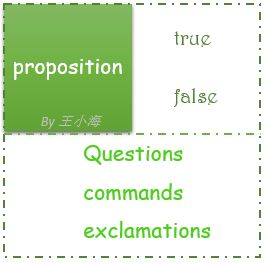We begin by examining more closely the most fundamental concepts in the studyof logic, concepts presupposed in the paragraphs just above. In reasoning weconstruct and evaluatearguments; arguments are built with propositions. Althoughthese concepts are apparently simple, they require careful analysis.
A.proposition
Propositions are the building blocks of our reasoning.A proposition asserts thatsomething is the case or it asserts that something is not.We may affirm a proposition,or deny it—but every proposition either asserts what really is the case, orit asserts something that is not.Therefore every proposition is either true or false.
There are many propositions about whose truth we are uncertain. “There islife on some other planet in our galaxy,” for example, is a proposition that, so faras we now know, may be true or may be false. Its “truth value” is unknown, butthis proposition, like every proposition, must be either true or false.
A questionassertsnothing, and therefore it is not a proposition.“Do youknow how to play chess?” is indeed a sentence, but that sentence makes no claimabout the world. Neither is a command a proposition (“Come quickly!”), nor isan exclamation a proposition (“Oh my gosh!”).Questions, commands,and exclamations—unlike propositions—are neither true nor false.
When we assert some proposition, we do so using a sentence in some language.However, the proposition we assert is not identical to that sentence.This is evident because two different sentences, consisting of different wordsdifferently arranged, may have the same meaning and may be used to assertthe very same proposition. For example, “Leslie won the election” and “Theelection was won by Leslie” are plainly two different sentences that make thesame assertion.
Proposition
A statement; what istypically asserted usingadeclarative sentence,and hence always eithertrue or false—althoughits truth or falsity may beunknown.
Statement
A proposition; what istypically asserted by adeclarative sentence,but not the sentenceitself. Every statementmust be either true orfalse, although the truthor falsity of a givenstatement may beunknown.
提供生词ANKI,自行下载导入:
名称:03Propositions -anki
链接:http://pan.baidu.com/s/1qXDjg3U
密码:y0b0
推荐学习:
《逻辑学导论》中英文版
《牛津大学开放课程:批判性推理入门》
《批判性思维工具》
